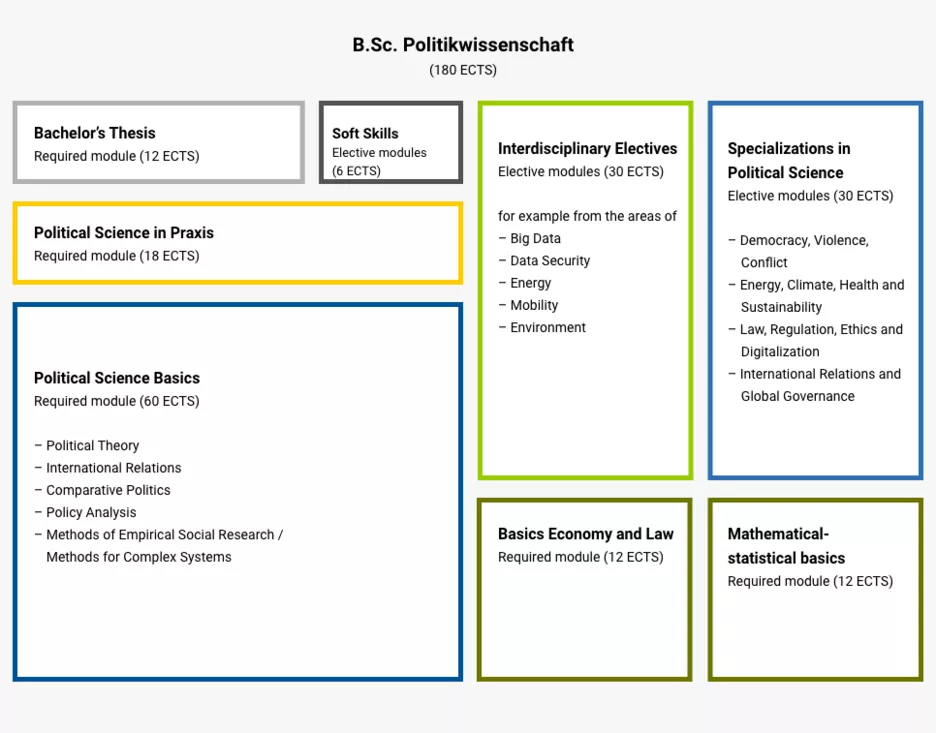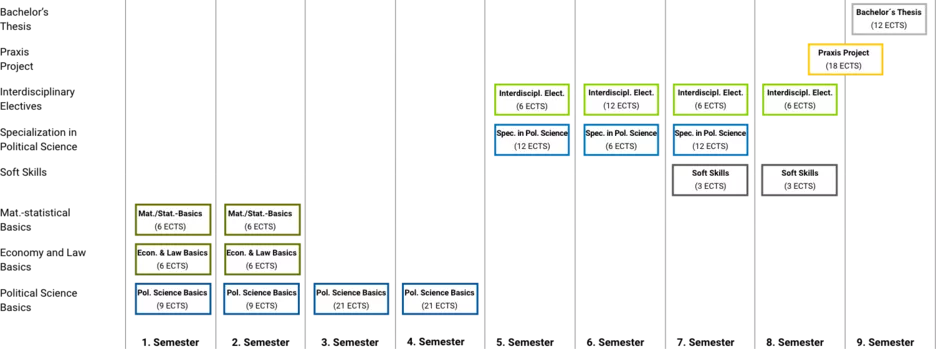Basic and specialization modules
Extended political science education
Students first acquire basic knowledge in all sub-areas of political science. These areas can be deepened in the higher semesters.
These include:
- Political theory
- International Relations
- Analysis and comparison of political systems
- Policy field analysis
- Methods of empirical social research
- Methods of complex systems
In addition, solid knowledge is acquired in the neighboring disciplines of economics (with a focus on macroeconomics) and law (especially public and administrative law with a focus on digitalization), as well as key competencies (soft skills, foreign languages).
To be able to connect with the students of the TUM partner institutions in the interdisciplinary part of the program, the Bachelor's program provides for compulsory attendance of mathematical and statistical foundation courses.
Specialisation modules and interdisciplinary study component
Interdisciplinary electives and specialization
Our B.Sc. degree program in Political Science offers insights into socio-politically and technologically relevant fields through an in-depth and interdisciplinary range of studies. It thus differs significantly from classic political science degree programs, in which additional subject areas are usually acquired through minor subjects.
If you are interested, you can choose to specialize in the area of political science. The choice of a political science specialization is optional. Students can choose from the following four political science specializations:
- Democracy, Violence, Conflict
- Energy, Climate, Health and Sustainability
- Law, Regulation, Ethics and Digitization
- International Relations and Global Governance
With the acquisition of the 30 credits from one of the associated elective modules of the respective specialization, the selected specialization is shown in the transcript of records. If no specialization is selected, the specialization modules can be put together individually in accordance with the subject examination regulations (Annex 1: Examination modules, point 2., valid from winter semester 2024/25).
In addition to the specialization modules, an extensive range of elective modules from the entire catalogue of the Technical University of Munich leads to the shaping of an individual profile. Depending on your interests, this flexibility allows you to focus on specific topics or to gain a comprehensive insight into diverse areas, such as big data/data security, energy, and the environment or water as a resource.
Practice Project and Bachelor’s Thesis
Insight into the working environment and possible stay abroad
A scientifically accompanied practice project as part of the curriculum enables insights into national and international institutions and companies. The high proportion of elective modules also makes it easier for students to spend part of their studies abroad.
At the end of the program is the Bachelor's Thesis.
Course of study
The degree program can be studied full-time or part-time (66%).
The figures show the ideal course of study for full-time and part-time study. Depending on the practice project, alternative courses of study were indicated.
The recommended study plan for the part-time model was stretched to 9 semesters with the same study content. The actual workload to be mastered was used to calculate the credits, not the credits acquired based on passed module examinations.
Each winter semester, a change between the full- and part-time model is possible.
The degree program can be studied part-time, i.e. while working:
- by concentrating political science lectures in the afternoon
- through the possibility of recognizing virtual courses such as the VHB
Please note that the part-time study model is not comparable to a distance learning program, as our courses are offered in Munich.
Do you have any questions?
In order to plan your individual course of studies, please contact the Student Advisory Service
Ekaterina Riembauer
+49 89 907793 077
ekaterina.riembauer(at)hfp.tum.de
Information about the virtual open office hours here.


